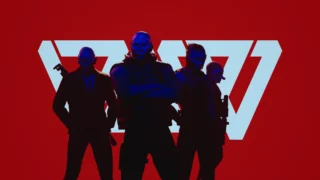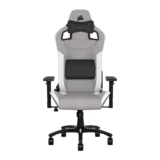Payday designers’ 10 Chambers is about to be ‘brutally honest’ about Den of Wolves
HANDS-ON: 10 Chambers’ much-marketed heist shooter might just live up to the hype

Years before players were intended to get their hands on it, 10 Chambers went loud with Den of Wolves. Since 2023, the much-anticipated return to the heist genre from creators of Payday 1 and 2 has enjoyed two consecutive The Game Awards blowouts, including a massive, dramatic drone show over Los Angeles.
What’s next, however, for a game with two of the loudest trailers these middle-aged ears have ever endured, looks set to be, in 10 Chambers’ own words, “brutally honest”.
Sometime in the near future, Den of Wolves will enter Early Access in a pre-alpha state – just as 10 Chambers’ previous game GTFO did, back in 2020 – giving players a direct line to its development. Alongside this, the studio has revealed it’s planning to premiere a lengthy video documentary series, Do the Game, which it says will document the development process behind the game, warts and all.
“We don’t want to follow the standard playbook just because it’s what everyone else in the industry does,” communications director Robin Björkell tells VGC. “For us, it’s about starting early; we think of it like a subway system: you pass through different stations and pick up new passengers along the way. Building a new IP is very different from working with an established one, and having as much time as possible is a huge advantage.
“When it comes to [the] Do the Game [documentary], it’s our way of capturing something real. It’s not about pretending everything is perfect. We’ve faced challenges in our mental health and in building a company, and we’ve also experienced huge wins. We wanted to be open about both.”
Watch our Den of Wolves gameplay video…
For a studio most recently known for its bold, flashy marketing, Do the Game is a surprising yet welcome switch of focus to the actual, human cost required to make triple-A video games. 10 Chambers said it wants to show players an “honest” take on the games industry, and an unfiltered account of what went into building Den of Wolves.
“The docuseries focuses more on the struggles of the people behind the game, rather than directly on Den of Wolves as a technical development project,” explains Björkell. “After making GTFO we felt – fuck, why didn’t we document the process more? That was an intense couple of years, very fierce. And there were many stories to be told from that development process – human stories. That’s why the cameras were introduced at the beginning; then the project evolved along the way.”
10 Chambers says it’s been filming for five years, from its more humble origins as a ten-person indie, to its modern setup as a Tencent-funded 100-person studio. More details will be revealed soon, including where Do the Game will be streamed, but assuming it delivers on the frank appraisal its spokespeople promise, it could offer an invaluable insight into the reality of a modern game developer, in an era when many are unsure of what goes into a triple-A production.
“I hope Do the Game speaks to others — to people who want our honest take on the industry, who are curious about how games are made, to future developers, and to entrepreneurs starting something of their own,” Björkell says.
“We believe it’s valuable to give people an insight into how challenging it is to create a game. It will hopefully make players understand better why a game can be delayed, for example, or why it’s not so easy to simply add a new feature. It’s so many factors involved in each phase of development. We have a saying that ‘every game that gets shipped is a miracle’. This documentary aims to explain why that is.”
The wolves at the door
Den of Wolves’ gameplay trailer from the last Game Awards teased a compelling mashup of Cyberpunk and Payday. Thankfully, the shift to sci-fi appears to be far more than a reskin of the 10 Chambers leads’ past work.
The game takes place in the late 21st century, when advanced AI has made digital security a pivotal issue for the world’s most wealthy companies. Their solution is Midway City, an unregulated mega city and ‘innovation zone’ controlled by corporations in the middle of the Pacific Ocean, where their vaults are locked by a new type of security system based on the human brain, which is deemed “unhackable”.

As with all historical proclamations goading the hacking community, Midway unsurprisingly attracts every aficionado of espionage and edgy street fashion to its shores, who soon build a criminal network of mercenaries up for sneaking into corporate computers in exchange for hard loot.
The plot sounds rather apt given the world climate – is that deliberate?
I know – it’s almost scary! However, the truth be told, when we conceived the story for Den of Wolves, this was well before the ‘AI revolution’ with ChatGPT and its associated developments. Many could probably see this happening, and it’s deliberate in the sense that we want the world in Den of Wolves to feel grounded and believable. And with the recent developments… maybe we succeed almost too well.
There is one district at launch – what’s the plan beyond that?
We plan to expand Midway City with more districts as we go through Early Access and Version 1.0. Some updates would be free, including the opening of new districts, while others could also be available as paid DLC packages. We aim to find a sustainable approach to developing Den of Wolves. This is a game we want to sustain for a long.
Do you hope to attract disgruntled Payday players?
Not particularly. We find no enjoyment at all in how Payday 3 was received, and we believe there’s room for more than one big heist game. Having said that, given our background in working on Payday 1 and 2, their player base will most likely find Den of Wolves interesting – and we will do our best to deliver.
“The types of missions and scenarios that you’ll be playing are about allowing yourself to be a tool for the corporations and their rivalry,” explains co-founder and audio director Simon Viklund. “That’s much more interesting to us as storytellers, because it gets personal between business founders and CEOs, which we find more compelling than military or political conflicts. There are a lot of late-stage capitalism examples of what businesses do that we’ve been able to draw inspiration from.”
The suggestion is that 10 Chambers has put a pleasing amount of work into the narrative of Den of Wolves, with each heist and preparation mission serving up compelling world-building for its Cyberpunk universe, rather than simply using it as a hollow aesthetic.
The Den of Wolves missions we were able to play (some of which you can see in the gameplay video on this page) contained elements that will be familiar to Payday fans – a crew of four players co-operate in preparation missions, leading to a fully-fledged heist – but it’s clear that the shift to sci-fi isn’t just window dressing for the gameplay either.
In one recon sequence, for example, all players were able to enter the mission space cloaked, allowing our team to set up an ambush before retrieving the drones and equipment we needed for the big mission. Players are also able to equip various sci-fi gadgets, like micro-turrets and portable shield walls – ideal for defending bank vaults being slowly cracked open by your robotic drones brought along to the mission.
10 Chambers says that the move to sci-fi has allowed it to be bolder with its ideas and scenarios, which is no more evident than in the ‘Dive’ sequence at the end of our heist. With bank vaults unlocked and loot carried to an extraction point – a huge window we plan to blow open using explosives – our crew is able to open one last mega-vault, revealing a boss with a mini-gun and one final challenge: the Dive.
Diving, in Den of Wolves’ universe, is when hackers enter the neural networks that AI can’t access, plugging their consciousness into a virtual world. In this sequence, our crew must defend against waves of enemies, whilst simultaneously warping into the virtual dive sequence, a head-spinning platform maze with enough gravity flipping to make a hungover journalist nauseous. The sequence is reminiscent of the most epic Destiny raid events, and with that kind of creative flexibility, you can see why Payday designer Andersson has been eager to create a sci-fi spin on the genre for many years.
“GTFO was the game we had to make, because we had a small funding, but we often say that Den of Wolves is the game we must make, because it’s a game that’s been on Ulf’s mind for well over ten years,” explains Björkell. “He needs to get it out of his system, and 10 Chambers is tailored to making this kind of game… Working on the Payday franchise, we felt limited in what we could do, as that game unfolds in the contemporary world. Adding the sci-fi aspect gives us much more creative freedom.”
“GTFO was the game we had to make, because we had a small funding, but we often say that Den of Wolves is the game we must make, because it’s a game that’s been on Ulf’s mind for well over ten years.”
10 Chambers won’t say when Den of Wolves will enter Early Access, but when it does, it will launch with one ‘district’ for players to explore and collect missions in. As it approaches version 1.0, it says it will add additional districts and updates, some for free, and others as paid DLC packages.
What we played of Den of Wolves, in truth, did not feel like pre-Alpha: the game is already polished enough with tight gunplay and compelling mechanics to satisfy a large audience of shooter fans, not least those dissatisfied by the most recent Payday game. However, as always with any kind of pre-release access in the current gaming climate, it’s impossible to foresee exactly how it will be received in the wild.
We came away from our playtime reassured, however, that 10 Chambers is carving its own path, with a compelling game universe and some unique ideas. While it’s never been tougher to predict success in the games market, one thing seems pretty certain: being derivative in the modern triple-A space is more often leading to failure, and in this regard, Den of Wolves feels more promising than most.
“As you said; the market now favours unique titles, especially from smaller studios and even one-man indie developers,” says Björkell. “However, to be completely honest, we don’t spend a lot of time researching the market to find a profitable genre for our games. First, we think it’s extremely hard to time the market. By the time your game is finished, which can take a long time, that trend may already be dead.”
It’s another frank answer from a studio that looks ready to follow up its smoke-and-mirrors theatrics by getting down to business, delivering on those tall promises.


























